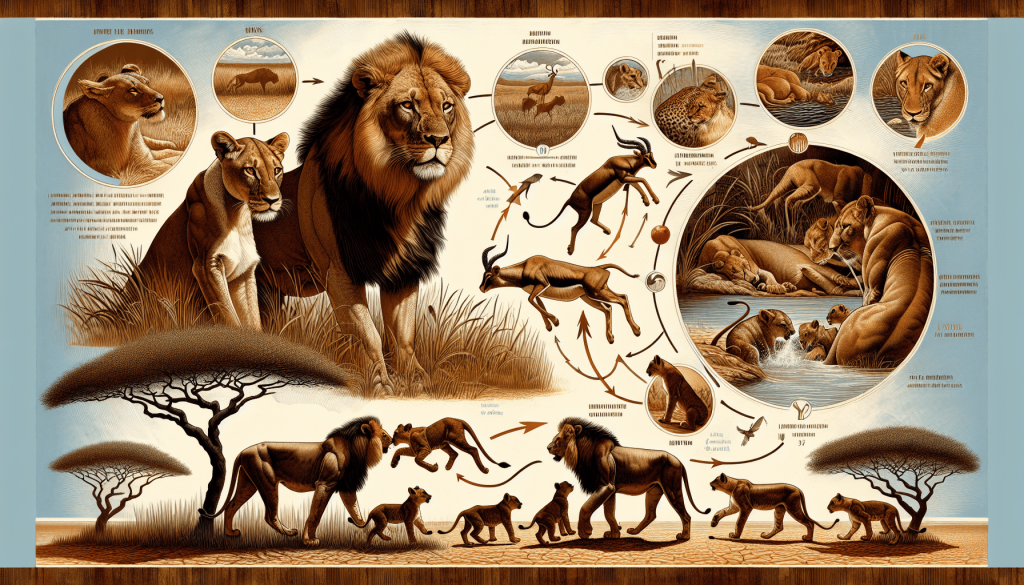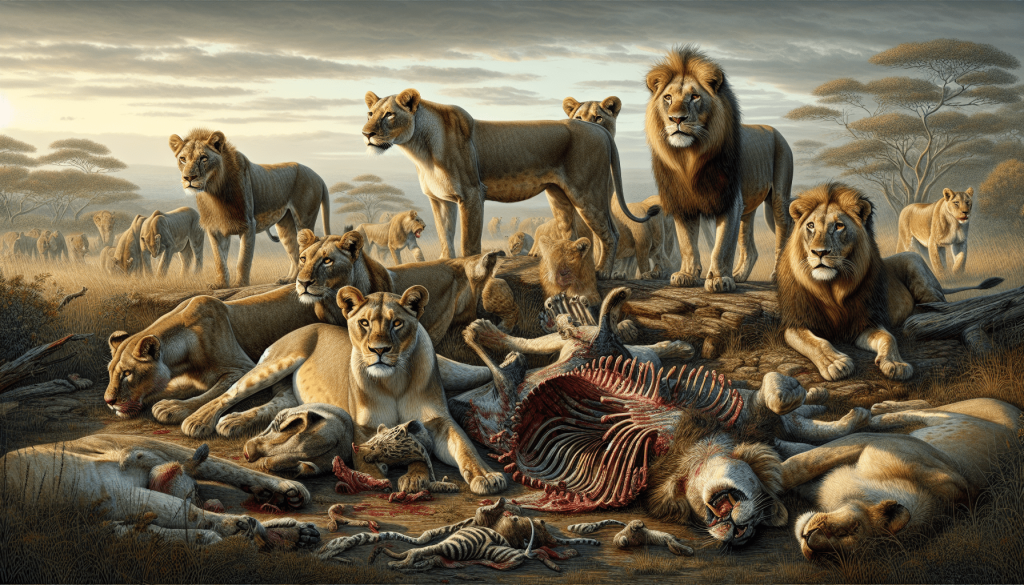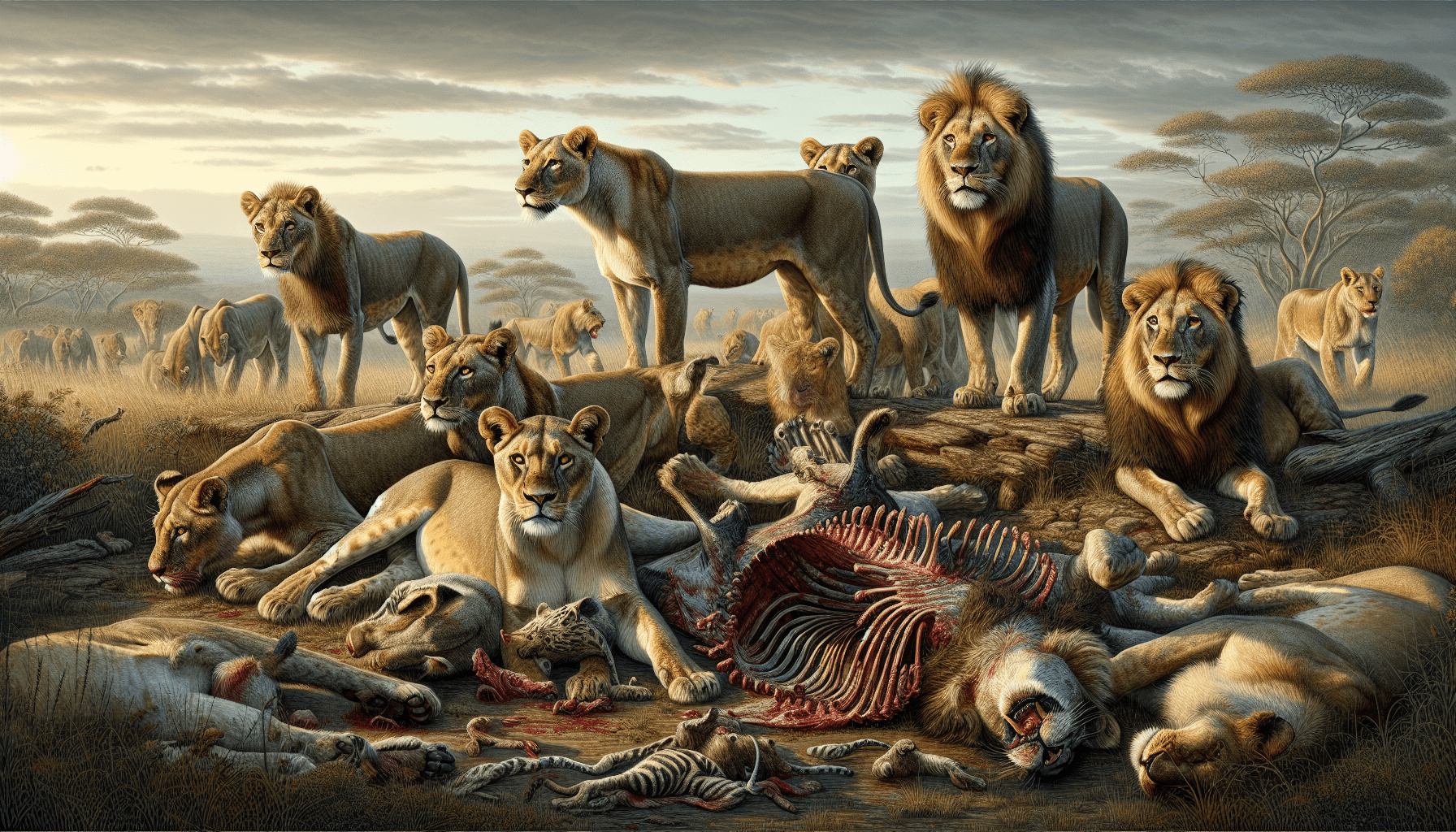So, have you ever wondered how long those majestic lions actually live for? Well, you’re in luck because we’re about to give you all the juicy details! Lions, known as the kings of the jungle, have a lifespan that can vary depending on a number of factors. From their habitat to their diet, these kings and queens of the savannah have quite the life expectancy. Buckle up and get ready as we take you on a journey to uncover the surprising truth about just how long these magnificent creatures roam our earth.

Lion Lifespan
Lions, also known as the “king of the jungle,” have a fascinating lifespan that varies depending on various factors. In this article, we will explore the average lifespan of lions in the wild, the factors that affect their longevity, and the milestones they go through at different stages of their lives. Additionally, we will discuss the mortality factors that impact lions, their longevity records, and how their lifespans compare to other big cats and domestic cats. We will delve into the life expectancy of lions in zoos, the impact of conservation efforts on their lifespan, and the importance of studying their aging process. Finally, we will explore the implications of lion management and how conservation strategies, breeding programs, and mitigating human-lion conflict can enhance their longevity.
Average Lifespan in the Wild
The average lifespan of lions in the wild typically ranges between 10 to 14 years. However, there have been instances where lions have lived beyond 16 years, showcasing their potential for longevity. Various factors influence the lifespan of the wild lions, including natural causes, inter-species conflicts, and human interactions.
Factors Affecting Lifespan
Several factors play a crucial role in determining the lifespan of lions. One of the primary factors is the availability of resources such as food, water, and suitable habitats. Lions that have access to abundant prey and ample water sources tend to live longer lives compared to those facing scarcity. Additionally, genetic factors and overall health also influence their longevity. Lions with strong genetics and good overall health tend to live longer and have a better chance of surviving harsh environmental conditions.
Lion Age Milestones
Cubhood
Like many other feline species, lions begin their lives as vulnerable cubs. Cubs are typically born in litters of two to four and rely heavily on their mother for survival. During the first few weeks, cubs are unable to see or hear, completely dependent on their mother’s care. As they grow, they gradually gain their senses and can start exploring their surroundings. Cubs usually stay with their mothers for up to two years before venturing out on their own.
Adolescence
During adolescence, lions experience significant physical changes and behavioral shifts. As they approach sexual maturity, males start developing their iconic manes, which serve as a display of their strength and dominance. Young males witness immense changes in their social dynamics as they leave their natal pride to seek their own territories and form alliances with other males.
Prime Adulthood
Prime adulthood marks the period when lions are at their physical peak. They are fully grown, possess impressive manes (in the case of males), and are actively involved in hunting and protecting their territory. This is the stage where lions are most likely to reproduce and contribute to the growth of their pride.
Senior Years
In their senior years, lions start experiencing a decline in physical abilities. Their hunting skills may diminish, and they may become more dependent on the younger members of their pride. Older lions often lose their territorial dominance and may either join a new pride or live as solitary individuals.
Lion Mortality
Natural Causes
Natural causes, such as diseases, injuries, and old age, contribute to lion mortality in the wild. Like any other living creature, lions are susceptible to a range of diseases, including viral, bacterial, and parasitic infections. Injuries obtained during hunting or territorial conflicts can also lead to mortality. As lions age, their bodies become more vulnerable to age-related ailments, ultimately impacting their lifespan.
Inter-Species Conflict
Inter-species conflict is another factor that can affect lion mortality. Lions often engage in fierce territorial battles with other lions, where injuries sustained during these conflicts can be fatal. Moreover, confrontations with other large predators like hyenas, leopards, or even African buffalos can pose a significant risk to the survival of lions.
Human Interactions
Human interactions pose a great threat to lion populations. Illegal hunting, habitat destruction, and the encroachment of human settlements into lion territories have significantly impacted their survival. Human-lion conflicts arising from retaliatory killings following livestock predation have also further endangered the lion population.
Lion Longevity Records
Longest-Lived Lions in Captivity
In captivity, where lions receive constant care and medical attention, they tend to live longer lives compared to their wild counterparts. The Guinness World Records recognizes Little Tyke, a female lion that lived for 24 years in captivity, as one of the longest-lived lions. Another remarkable lion was King George V, who lived for an impressive 26 years in a zoo.
Longest-Lived Lions in the Wild
In the wild, lion longevity records are harder to ascertain due to the challenges of tracking individuals over their entire lifespan. However, there have been reports of lions living beyond 16 years, with specific individuals reaching up to 18 years old or more. These long-lived lions are often recognized for their ability to adapt, secure territories, and acquire abundant food sources.

Comparative Lifespans
Lion vs Other Big Cats
In comparison to other big cats, such as tigers and leopards, lions have a relatively shorter lifespan. Tigers and leopards have been known to live up to 20 years in the wild. The differential longevity can be attributed to various factors such as ecological niche, hunting strategies, and territorial dynamics, which may differ significantly among these magnificent feline species.
Lion vs Domestic Cat
Domestic cats, especially those that receive proper care and live indoors, enjoy a longer lifespan compared to their wild counterparts. On average, domestic cats can live up to 15-20 years or more, surpassing the average lifespan of lions in the wild. The difference in lifespan can be attributed to the controlled environment, regular veterinary care, and balanced diet that domestic cats often receive.
Lion Life Expectancy in Zoos
Captive Conditions
Lions in zoos benefit from controlled environments and dedicated care, including regular veterinary check-ups, proper nutrition, and social stimulation. These favorable conditions contribute to extending their lifespan. In well-managed and accredited zoos, lions can live into their late teens or even early twenties.
Healthcare and Nutrition
Lions in zoos receive specialized veterinary attention, allowing for early detection and treatment of ailments, thus increasing their life expectancy. Proper nutrition is crucial, and zoos ensure that lions have access to a balanced diet, replicating their natural feeding habits to maintain their optimal health.
Genetic Factors
Zoos often participate in captive breeding programs to ensure the genetic diversity and long-term survival of lions. By carefully selecting mates, zoos can mitigate genetic issues that may affect longevity. This genetic management helps maintain healthy populations and ensures that lions born in captivity have the best chance of a long and fulfilling life.
Lion Conservation and Lifespan
Impact of Conservation Efforts
Conservation efforts promoting habitat preservation, anti-poaching measures, and reducing human-lion conflicts have a direct impact on the lifespan of lions. By protecting their natural habitats and securing stable prey populations, conservation initiatives provide the necessary resources for lions to thrive and extend their lifespan in the wild.
Threats to Lion Longevity
Despite conservation efforts, lions still face significant threats that impact their lifespan. Illegal hunting, habitat loss due to human development, and fragmentation of their territories pose severe challenges to their survival. Climate change and the decline of vital ecosystems also contribute to the decrease in prey availability, further compromising their longevity.
Rescuing and Rehabilitating Lions
Non-profit organizations and wildlife rescue centers play a vital role in rescuing and rehabilitating lions that have suffered from various challenges. These facilities provide medical care, rehabilitative support, and safe environments for lions to recover and, if possible, be reintroduced into the wild. Efforts like these contribute to extending the lifespan of lions that would not have survived without human intervention.
Longevity Research
Studying Aging in Lions
Researchers have been studying the aging process in lions to gain a deeper understanding of their lifespan and the factors that influence it. By examining factors such as genetic predispositions, disease prevalence, and environmental influences, scientists can develop more effective conservation strategies and improve the overall management of lion populations.
Advancements in Age Determination
Advancements in technology and techniques have enabled researchers to determine the ages of lions more accurately. They utilize non-invasive methods, such as dental analysis and DNA testing, to estimate the age of individuals. By improving age determination, researchers can track the individual and population-level health of lions more effectively, aiding in their conservation.
Implications for Lion Management
Conservation Strategies
Conservation strategies aimed at protecting lion populations and their habitats are essential for ensuring their longevity. By implementing measures that address key threats, such as habitat loss, poaching, and human-lion conflicts, conservationists can create sustainable environments where lions can thrive and live longer lives.
Breeding Programs
Captive breeding programs play a vital role in maintaining genetic diversity and protecting the long-term viability of lion populations. Well-managed breeding programs can improve the overall health of captive lions and help maintain a healthy and sustainable captive population.
Mitigating Human-Lion Conflict
Efforts to reduce human-lion conflicts are critical to improving lion longevity. By implementing measures such as community education, livestock protection, and alternative livelihood options for local communities, it is possible to minimize conflicts and promote coexistence between humans and lions.
Conclusion
The lifespan of lions is influenced by numerous factors, including natural causes, inter-species conflicts, and human interactions. While lions in the wild typically live between 10 to 14 years, captive lions can exceed this lifespan due to favorable conditions, healthcare, and genetic management in zoos. Conservation efforts, such as habitat preservation and mitigating human-lion conflicts, play a vital role in protecting and extending the lifespan of lions in their natural habitats. Continued research on lion longevity and advancements in age determination techniques are crucial for improving lion management and ensuring the survival of these majestic creatures for generations to come.

